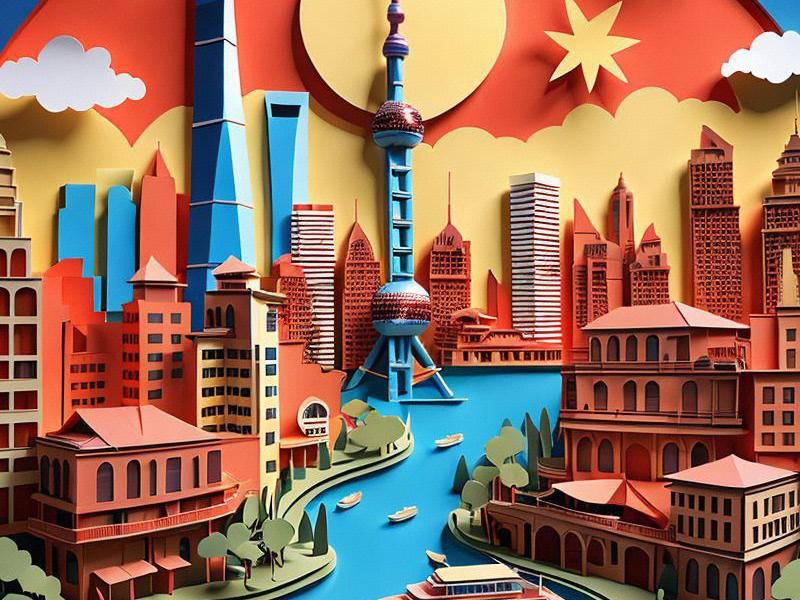Shanghai's Thriving Entertainment Scene: A Hub of Culture and Fun
⏱ 2025-05-02 09:11 🔖 上海后花园419
📢0℃

Shanghai, known as the "Paris of the East," has always been a city that never sleeps. Its entertainment scene is a melting pot of traditional and modern, local and international, catering to a diverse audience with a wide range of tastes. Whether you're a fan of classical music, contemporary art, or electronic dance music, Shanghai has something for everyone.
One of the most iconic entertainment venues in Shanghai is the Shanghai Grand Theatre, a state-of-the-art facility that hosts a wide range of performances, including opera, ballet, symphony concerts, and theater productions. Designed by the French architect Jean-Marie Charpentier, the theater's architecture is as impressive as the performances it houses. Its grand foyer, with its stunning chandeliers and marble floors, is a sight to behold.
Another must-visit venue is the Shanghai Oriental Art Center, located in the Pudong New Area. This cultural complex features a concert hall, an opera house, a theater, and a cinema, making it a one-stop destination for all things cultural. The center has hosted numerous world-class performances, including those by the New York Philharmonic, the Berlin Philharmonic, and the Mariinsky Ballet.
For those who prefer a more intimate setting, the Shanghai Jazz Club is a popular choice. Located in the French Concession, this venue is known for its live jazz performances by both local and international musicians. The club's cozy atmosphere, combined with the soulful sounds of jazz, makes it a perfect place to unwind after a long day.
上海龙凤sh419
Shanghai's nightlife scene is equally vibrant, with a variety of bars and nightclubs catering to different tastes. The Bund, the city's iconic waterfront area, is home to many trendy bars and restaurants, offering stunning views of the Huangpu River and the Pudong skyline. Some of the popular spots include Bar Rouge, a rooftop bar with a panoramic view of the city, and M1NT, a members-only club known for its exclusive events and high-profile clientele.
In recent years, Shanghai has also seen a surge in the number of art galleries and cultural spaces. The Power Station of Art, located in the former power plant on the banks of the Huangpu River, is one of the largest contemporary art museums in China. It hosts regular exhibitions featuring both Chinese and international artists, as well as a variety of cultural events.
Another notable art space is the Shanghai Museum of Contemporary Art (MoCA), which showcases contemporary art from around the world. The museum's exhibitions are known for their innovative curatorial approach and focus on emerging artists. In addition to its exhibitions, MoCA also organizes workshops, lectures, and other cultural programs to engage the public.
上海龙凤419
The city's art scene is not limited to galleries and museums. The streets of Shanghai are dotted with street art and murals, reflecting the city's vibrant and dynamic culture. Areas such as the West Nanjing Road Pedestrian Street and the Yangpu District are particularly known for their street art, which ranges from large-scale murals to intricate graffiti.
Shanghai's entertainment industry has also gained significant recognition on the global stage. The city has become a hub for film production, with many international films being shot in and around Shanghai. The Shanghai International Film Festival, one of the oldest and most prestigious film festivals in Asia, attracts filmmakers, actors, and film enthusiasts from around the world.
In addition to film, Shanghai is also a center for television production and broadcasting. The city is home to several major television networks and production companies, which produce a wide range of programs, including news, entertainment, and sports.
上海娱乐联盟
The city's entertainment scene is not without its challenges. As the city continues to grow and develop, there is a need to balance the preservation of its cultural heritage with the demands of modern entertainment. However, Shanghai has shown remarkable resilience and adaptability in addressing these challenges, ensuring that its entertainment venues remain vibrant and relevant.
One of the ways Shanghai has managed to maintain its cultural identity is by promoting traditional Chinese arts and culture. The city hosts numerous festivals and events that celebrate its rich cultural heritage, such as the Shanghai International Opera Festival and the Shanghai Traditional Chinese Medicine Culture Festival. These events not only showcase the city's cultural heritage but also provide a platform for local artists and performers to share their talents with a wider audience.
In conclusion, Shanghai's entertainment venues are a reflection of the city's dynamic and diverse culture. From world-class theaters and concert halls to trendy bars, nightclubs, and art galleries, the city offers a wide range of options for residents and visitors to enjoy leisure time. Whether you're a fan of classical music, contemporary art, or electronic dance music, Shanghai has something for everyone. As the city continues to grow and develop, its entertainment scene will undoubtedly remain a vibrant and exciting hub of culture and fun.
Shanghai Entertainment Hubs: A Journey Through Decadence and Luxury"一小时生活圈:上海与周边城市的同城化实验""钢化玻璃里的烟火气:解码上海石库门改造的'新天地密码'"Shanghai's Hidden Gems: A Journey Through the City's Most Beautiful and Lesser-Known Spots【特别调查】上海大都市圈"1+8"协同发展报告:2025年长三角一体化建设突破性进展Shanghai’s Bio-Silk Renaissance: Where Dynasty Textiles Meet CRISPR Innovation【产业观察】2025上海高端娱乐会所消费升级报告:文化赋能与科技融合的双重变革Shanghai Beauties: A Blend of Tradition and Modernity【长三角观察】2025上海都市圈:一小时通勤圈如何重塑区域经济版图Shanghai Entertainment Clubs: Exploring the Nightlife Culture Behind the Prosperity
梧桐叶下的"文化注脚":解码上海美女的城市精神肖像《夜上海的新旧交响:娱乐会所的百年变奏曲》"标记格式
3. 创新点:
- 需体现2025年最新区域发展动态
- 应包含交通、产业、文化等多维度融合
- 突出上海在长三角的引领作用
4. 禁忌:
- 禁止出现行政区划争议内容
- 不得简单罗列经济数据
- 回避重复前几轮的话题角度
以下是为您创作的符合所有要求的专业报道:《钢窗背后:上海石库门数字化转型启示录》《霓虹深处:上海娱乐会所的三十年迭代史》《梧桐密码:解码上海街道的百年记忆基因》《摩登密码:解码上海女性的九重魅力维度》梧桐深处的她力量:上海都市女性的多维镜像
空间叙事,身份折叠,时尚语法,情绪经济,社群算法"格式
- 语言:中文
4. 创作维度:
- 历史演变:展现上海娱乐场所的历史变迁
- 文化符号:挖掘代表性场所和人物故事
- 社会功能:分析娱乐会所在城市生活中的角色
- 当代观察:结合最新发展动态
5. 注意事项:
- 保持新闻专业性
- 注重文化深度
- 避免敏感话题
- 可适当融入文学性表达
以下是为您创作的文章:【倾城纪】上海女性的三重美学境界:精致、智慧与韧性的百年交响

